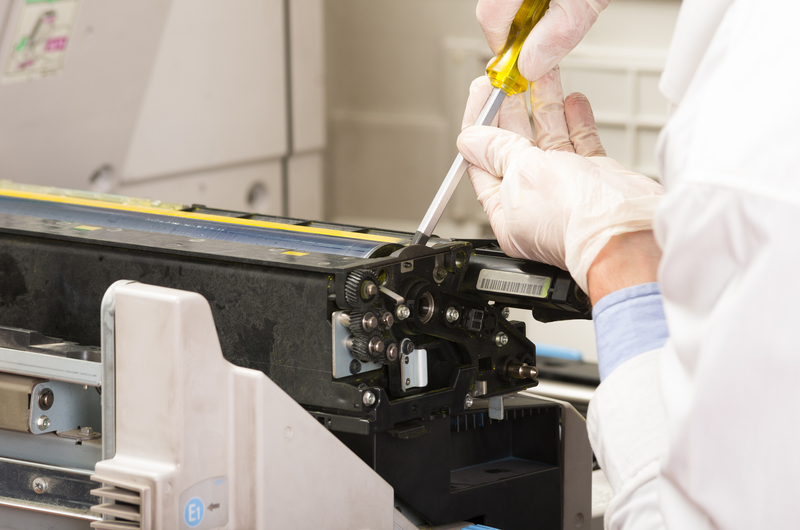Smart Solutions for Disposing of Damaged Cooking Utensils
Every kitchen, whether professional or home-based, encounters the inevitable: damaged cooking utensils. Over time, knives dull, spatulas crack, pots lose their luster, and plastic tongs melt from accidental contact with a hot stove. Disposing of these broken kitchen tools and ruined pans is more challenging than simply tossing them in the trash. In our eco-conscious era, finding smart, sustainable, and safe methods for dealing with damaged pots and pans -- as well as all varieties of kitchenware -- is essential. This comprehensive guide uncovers smart disposal solutions that minimize environmental impact and offer practical value for your home and community.
Why Proper Disposal of Damaged Cooking Utensils Matters
Disposing of unwanted or damaged kitchen utensils might seem straightforward, but incorrect handling can have adverse effects:
- Environmental Impact: Many cooking utensils contain plastic, non-biodegradable coatings, or metals that can take centuries to break down in landfills.
- Resource Waste: Throwing away valuable metals or materials without recycling means wasting the energy and resources needed to mine and produce them.
- Household Safety: Broken glassware or jagged metal pieces pose safety risks during disposal.
Adopting smart disposal strategies for your old or broken cookware and utensils is key to living a sustainable, responsible lifestyle.

What Are Common Types of Damaged Kitchen Utensils?
Before choosing the right disposal method, it's important to identify what you're working with. Here are some common types of damaged utensils and cookwares:
- Nonstick Pans: Scratched or peeling nonstick surfaces can become toxic with further use.
- Cast Iron Skillets: Severely rusted or chipped pans may no longer be safe for cooking.
- Plastic Utensils: Melted, warped, or cracked spoons, spatulas, and measuring cups.
- Stainless Steel Tools: Bent, misshapen, or heavily corroded whisks, ladles, and forks.
- Glass and Ceramic: Chipped mugs, fractured casserole dishes, or broken bakeware.
- Wooden Items: Splintered or excessively worn cutting boards and wooden spoons.
Reusable or Repurpose Damaged Kitchen Utensils
The greenest option for broken or old cooking utensils is to keep them out of the waste stream altogether. Repurposing not only saves resources but can add character to your home.
Creative Repurposing Ideas
- Garden Labels: Old spoons or forks make excellent plant markers. Just engrave or paint the herb or veggie name onto the handle and stick it into the soil.
- Kitchen Art: Create a whimsical wall display from a collection of warped or uniquely shaped utensils.
- Tool Hooks: Attach wooden or metal kitchen tools to a board for a rustic key or utensil rack.
- Children's Crafts: Supervise simple crafts such as spoon puppets or mosaic pieces from pieces of broken ceramics.
- Birdfeeders: Old teacups or large spoons can be turned into charming birdfeeders for your backyard.
- Plant Watering: Bent or damaged ladles can be repurposed as scoopers for your indoor garden.
While not every item is safe to reuse for food purposes, giving a second life to your old kitchen tools reduces landfill waste and offers opportunities for creativity.
Recycling Cooking Utensils: What Can and Can't Be Recycled?
Knowing what your local recycling program accepts is critical for smart disposal of kitchen utensils and cookware.
Metals
- Stainless Steel and Aluminum: Most recycling centers accept these metals, which are commonly used in pots, pans, whisks, and ladles. Remove plastic or rubber handles if possible.
- Copper: Valuable copper pots or pans can often be recycled at metal-specific facilities - sometimes for cash!
Cookware with Nonstick Coatings
- Nonstick Pans: Many centers will not accept cookware with Teflon or other nonstick coatings due to processing challenges. Check with the manufacturer or look for specialty recycling events.
Plastics
- Plastic kitchen utensils are often made with mixed polymers, which many municipal recycling facilities can't accept.
- Look for numbers on your utensils (such as #5 PP for polypropylene) and match against your local recycling guidelines.
Glass and Ceramics
- Most temperate glass, Pyrex, or ceramic bakeware cannot be recycled curbside.
- Check with a facility specializing in ceramics or construction waste. Otherwise, consider creative reuse or disposal in the waste bin.
If you're unsure whether your damaged utensil is accepted for recycling, contact your local recycling center for clarification.
Manufacturer Take-Back Programs and Mail-Back Services
Many brands now offer responsible end-of-life solutions for their kitchenware. Here's how you can leverage these initiatives:
- Mail-Back Programs: Some companies (like Calphalon, TerraCycle, or Le Creuset) operate mail-in programs that allow you to return old utensils and cookware for recycling or proper disposal.
- In-Store Collection: Major retailers, such as Sur La Table or Williams Sonoma, may organize annual events to collect and recycle damaged kitchenware from any brand.
*Always check eligibility and rules before mailing back items. Some programs cover shipping, while others may have a fee.*
Donating Still-Usable Kitchenware
If your utensils are aged but not damaged beyond repair, consider giving them a second home:
- Charity Donation Centers: Places like Goodwill or Habitat for Humanity will often accept functional kitchen utensils.
- Community Kitchens and Shelters: Local soup kitchens or family shelters may welcome serviceable pots, pans, and utensils.
- Freecycle or Online Marketplaces: List gently used kitchen ware on platforms like Facebook Marketplace, Craigslist, or community Freecycle boards.
Even if your items aren't in pristine condition, someone handy may be able to repair or upcycle them.
Preparing Damaged Cooking Utensils for Safe Disposal
Regardless of your disposal method, safety comes first. Take precautions to avoid injury and ensure proper processing.
- Sharp Objects: Wrap broken glass, knives, or jagged metal in several layers of newspaper or cardboard, and tape securely before placing in trash or recycling.
- Remove Non-Recyclables: Take off plastic, rubber, or wooden handles from metal utensils when requested by local guidelines.
- Clean Thoroughly: Always wash your used cookware and utensils before recycling or donating to avoid contamination and bad odors.
- Label Packed Items: Mark "sharp" on any bag or box containing breakable or dangerous items.
Smart Solutions for Bulk or Professional Kitchen Disposal
For commercial kitchens or those doing major upgrades, disposing of a large quantity of damaged utensils and cookware can be a challenge. Consider:
- Bulk Metal Recycling: Contact scrap metal facilities for large pick-ups of unusable metal cookware or utensils.
- Donation Drives: Organize periodic donation events with staff to gather gently used items for those in need.
- Contact Specialized Waste Management: Some companies cater specifically to restaurant equipment recycling, ensuring safe and responsible handling.
Sustainable Alternatives to Traditional Kitchen Utensils
The best way to tackle disposal problems is to prevent damage and waste upfront. When upgrading or replacing kitchen tools, consider:
- Choose Durable Materials: Stainless steel, silicone, and high-quality wood products last longer and resist breakage.
- Buy Repairable and Modular Items: Utensils with replaceable parts (such as changeable silicone heads) can be fixed instead of discarded entirely.
- Select Recyclable or Compostable Materials: Seek out bamboo or recycled-content utensils, which have lower environmental footprints and can be composted or more easily recycled at end of life.
- Prioritize Reputable Brands: Invest in kitchenware from companies with take-back, recycling, or warranty programs.
Smart Tips for Prolonging the Lifespan of Your Kitchen Utensils
Reducing the frequency of utensil replacement is a key step in minimizing waste. Here's how to care for your kitchen tools:
- Follow Manufacturer's Care Instructions: Many items are hand-wash only or require gentle scrubbing.
- Avoid High Heat for Plastics: Keep plastic utensils away from hot pans and open flames to prevent warping.
- Season Wooden Items: Periodically oil wooden spoons and cutting boards to keep them from cracking and splintering.
- Sharpen and Maintain Metal: Regularly hone knives and clean metal utensils to prevent corrosion and dullness.

Where to Find Local Solutions for Disposing of Damaged Utensils
If you're not sure how to dispose of your damaged kitchenware in your area, there are several resources available:
- Municipal Waste Websites: Most cities and towns provide detailed recycling and disposal guides online.
- Recycling Apps: Tools like iRecycle or Earth911 help you locate drop-off points by item type and zip code.
- Local Hardware Stores: Some stores host drive-up recycling days for metal, electronics, and other hard-to-dispose-of items.
- Community Social Media Groups: Crowdsourcing advice from neighbors can lead to the discovery of niche recycling or upcycling opportunities.
Conclusion: Embracing Smart and Sustainable Disposal of Old Kitchen Tools
Disposing of damaged cooking utensils and unwanted kitchenware doesn't have to damage the environment or your conscience. By embracing smart solutions for utensil disposal--from repurposing, recycling, and donating, to seeking out manufacturer take-back programs and investing in sustainable alternatives--we can all play a part in reducing kitchen waste. Next time you upgrade your cooking tools or find yourself with a pile of broken spatulas, think outside the trash bin:
- Get creative with upcycling projects.
- Consult local resources and recycling guidelines.
- Pass on still-useful pots, pans, and gadgets to those who need them.
With a little effort and ingenuity, every home cook can contribute to a cleaner, greener planet while keeping their kitchen clutter (and conscience) clear.